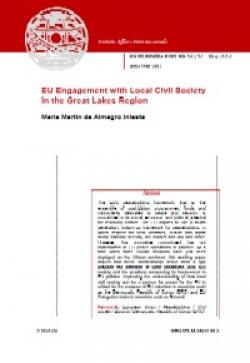EU Engagement with Local Civil Society in the Great Lakes Region
The EU's peacebuilding framework, that is, the ensemble of post-Lisbon programmes, funds and instruments dedicated to peace and security, is unmatched in its social, economic and political potential for resolving conflict. The EU aspires to use a fourth generation, bottom-up framework for peacebuilding, in which respect for local identities, culture and rights trump national security, the market and law and order. However, this normative commitment has not materialized in EU peace operations in practice. At a time when three civilian missions have just been deployed on the African continent, this working paper argues that these shortcomings derive from a gap between the definition of what constitutes local civil society and the practices concerning its involvement in EU policies. Improving the understanding of how local civil society can be a partner for peace for the EU is critical for the success of EU missions in countries such as the Democratic Republic of Congo (DRC) and EU Delegation tasks in countries such as Burundi.
-
Details
Roma, Istituto Affari Internazionali, 2013, 16 p. -
Issue
1317 -
ISBN/ISSN/DOI:
978-88-98042-88-3
Introduction
1. The EU Peacebuilding Framework and the European Security Strategy: towards a bottom-up approach to peacebuilding
2. EU-Africa Partnership for Peace and Security: a not so easy relationship
3. EU policy (in)coherence: civil society discourse and practice
4. EUPOL DRC and the Integrated Police Unit: local ownership by whom?
5. The EU Delegation and the OSCAR programme in Burundi: towards the construction of civil society
6. Opportunities, procedural shortcomings and the EU interest
7. Recommendations for more effective EU engagement with local civil society via EU civilian operations
References



